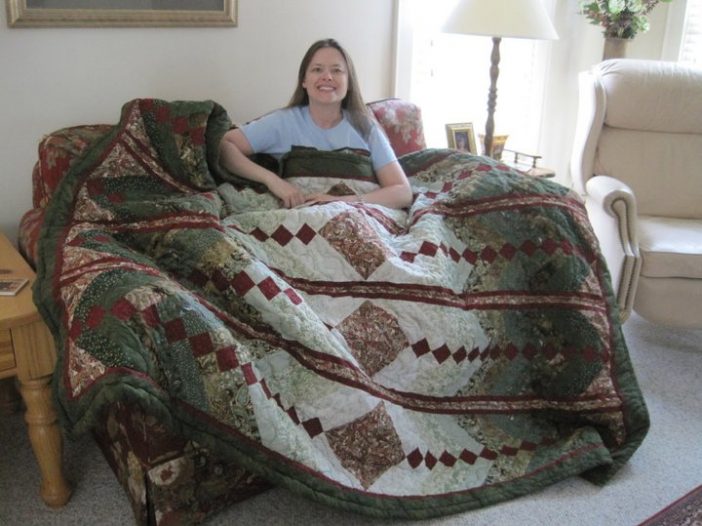
Every year at my week-long quilt retreat, I meet up with friends and indulge in my favorite pastime. Even though I am a doctor, and you’d think nothing about quilting could be scary, there are things I’m reluctant to try. Appliqué (APP-lik-ay) was one of those things. I had made a star quilt for a friend’s baby, and because of a mistake in the instructions, it couldn’t be sewn together with squares at the corners to make a quilt top. I asked one of our more experienced quilters for help.
Martha is a retired teacher, and she is brilliant at explaining things in a non-intimidating way. She suggested I appliqué the piece onto a large square of fabric, thereby removing the problem of the not-quite-90-degree angles. I hemmed and hawed. I wasn’t really looking to try something new.
“Come here, Darlin’,” she said in her no-nonsense tone. “Let’s get this done.”
She walked me through the process. She was always there to answer questions when I was stuck. She never made me feel stupid or like I was bothering her.
That’s the kind of teacher I try to be.
I don’t know what makes people think that the best way to teach someone is to humiliate and insult them. I can’t fathom why we want students to absorb something and determine that the most prudent course of action is to make sure they are sleep deprived before imparting information. The most common “reason” I hear is “that’s how I had to learn it.” If only I could cough and say the word bullshit at the same time in writing.
I talked to a vet student from Iowa State this week, and we found we had the same passion – wellness for students. Obviously, it would be easier if we could start wellness as children, but if we can’t, then starting with future vets and techs is the next best thing. I know that school is hard (I’ve been there), but there are things we can do to make learning better and help us turn out resilient, healthy students. If we are turning out brand new veterinary professionals that are already riddled with burnout and compassion fatigue, why are we congratulating ourselves?
I’m not suggesting trophies for everyone or not using red pen so as to preserve everyone’s feelings. I’m saying that we need to provide support while having the goal to turn out self-sufficient, confident veterinarians and technicians who either know the answers or know how to find them.
The professors, staff, and students in school who bully and torment others are not a secret. EVERYONE knows. When I was in school, there was a professor who picked a favorite and least favorite student and proceeded to lift them up and stomp on them, respectively. And we were warned ahead of time that this would absolutely happen. That kind of crap needs to stop freakin’ yesterday.
Are we professionals, or are we a fraternity running a hazing? You know how everyone freaks out and destroys campus groups when they do something stupid that results in a death? Maybe we need to look at school the same way. Veterinary professionals are contemplating and dying by suicide at an alarming rate. We need to make sure that as teachers, we aren’t contributing to the problem.
It is said that we learn the most from failure. This is true. How we learn and recover from failure is directly related to how we and those around us react. If shame comes from within (as it always does) AND without, then we don’t have a hope of recovering in a positive way. For instance, I once attempted to spay a male cat. When I discovered the mistake, I went to my boss in tears. He chuckled and said, “If you haven’t tried to spay a male cat, then you’re either new to this or lying.” Then he sat down with me and we created a protocol to ensure this never happened again.
He emphasized that while it was also my job to check, the staff had missed this, as well. He also walked me through what to say to the owner and was nearby while I called and spoke to him. Had he yelled at me or written me up, I probably would have been too afraid to attempt surgery again for a long time.
Some lessons have to be harsh so they are taken seriously. But vet medicine has a natural harshness built in: if we screw up, our patients may die. That should be the hardest lesson we have to learn – and every single one of us will learn it the hard way.
Congratulations to the schools making wellness a priority. Thank you for putting your students first. Thank you for remembering these students are, in fact, your customers. They are paying you large amounts of money (in some cases hundreds of thousands of dollars) and treating them like dirt shouldn’t be an option. In fact, I’m guessing if they aren’t left with scars from your school, you might actually get a donation from them when you come asking.
I’m challenging everyone who teaches to decide what kind of teacher they want to be. Will you leave impressions or scars? Will you build up or tear down? Will you be remembered with gratitude or as a traumatic experience? The choice is yours, and I hope you make the right one.
The views and opinions expressed in this article are those of the author and do not necessarily reflect the position of the DrAndyRoark.com editorial team.